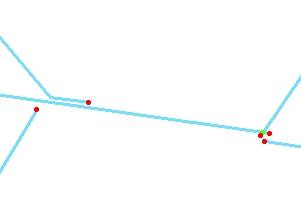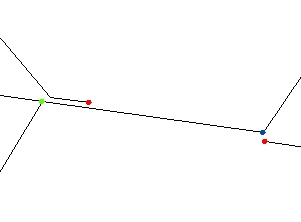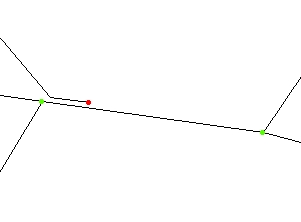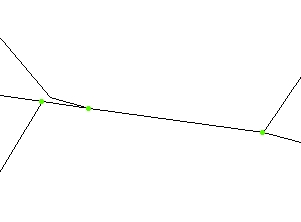
No "Node Snap" or 'Nearest Snap" used

"Node Snap" used

"Node Snap" and "Nearest Snap" used

Go to ET GeoWizards 12.x User Guide
Cleans the dangling nodes from a polyline layer using user specified dangling tolerance
Inputs:
Outputs:
Notes :
Examples:
| Before Clean Dangles |  |
| After Clean No "Node Snap" or 'Nearest Snap" used |
 |
| After Clean "Node Snap" used |
 |
| After Clean "Node Snap" and "Nearest Snap" used |
 |
ToolBox
implementation
(Go to TOP)
Command line syntax
ET_GPCleanDangle <input_dataset> <out_feature class> <dangling_tolerance> {closest_node_snap} {nearest_feature_snap}
Parameters
| Expression | Explanation |
|---|---|
| <input_dataset> | A Polyline feature class or feature layer |
| <out_feature class> | A String - the full name of the output feature class (A feature class with the same full name should not exist) |
| <dangling_tolerance> | A Double representing the tolerance to be used. The polylines with dangling nodes within distance smaller than this value to existing features (depending on the options used) will be extended/snapped to the closest existing feature |
| {closest_node_snap} | A Boolean - if True, the ends of the dangling polylines that could not be snapped to an existing polyline by extending in the direction of the last segment will be snapped (if the dangling node is within a distance smaller than the <dangling_tolerance> to an existing node) to the closest existing node. |
| {nearest_feature_snap} | A Boolean - if True, the ends of the dangling polylines that could not be snapped to an existing polyline by extending in the direction of the last segment or to an existing node will be snapped (if the dangling node is within a distance smaller than the <dangling_tolerance> to an existing polyline) to the closest point of the closest polyline |
Scripting syntax
ET_GPCleanDangle (input_dataset, out_feature class, dangling_tolerance, closest_node_snap, nearest_feature_snap)
See the explanations above:
<> - required parameter
{} - optional parameter
| Copyright © Ianko Tchoukanski |